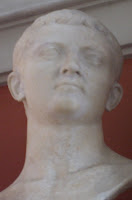
Byzantium, the medieval Eastern remnant of the ancient Roman empire, a powerful empire in its own right, dominated the Eastern Mediterranean and Asia Minor for over 1,000 years, from the 4th c.AD to its eventual fall to the Ottoman Turks in 1453 AD.
The Byzantine empire was a melting pot of East and West, with the Eastern Orthodox church reigning supreme and influencing almost all aspects of people's lives, while the pagan elements from the time when Emperor Constantine relocated Rome to Byzantium as an intended new capital for the Roman empire, provided for an interesting and strange mixture of pious and fanatical Orthodoxy with a simultaneous exploration of ancient thought and lifestyle. As might be expected in such a situation there were many contrasts within the empire's way of life and belief-system, the Byzantine eunuch being one of these.
Over the centuries we see eunuchs, essentially castrated men, employed as guards for the mighty in many cultures including ancient Egypt, China, Japan and the Muslim Caliphate. Court eunuchs, who were viewed as exotic, highly prized for their soft skin, high-pitched voices and hairless bodies, were also seen as safe in the sense that they could not produce heirs. Crusaders from the West were amazed and horrified when they saw how plentiful and even powerful Eunuchs were in Byzantium, many times gaining powerful administrative positions in government, the church and great estates of the nobility.
Eunuchs were clearly used for sexual reasons as well, and the passive role was more than often reserved for them in particular, despite this being abhorred and condemned by the clergy.
A eunuch was "created" at a young age, typically just before reaching puberty. As the "operation" was considered humiliating and repugnant, this treatment was mainly administered to prisoners of war. They would have both their penis and testicles removed and those who survived this horrendous amputation would often be shipped to markets to provide slave labour for the Islamic countries too. (Such a famous market existed in Verdun, in northern France during the 10th c.AD.
There were certain key offices in Byzantium though, reserved especially for eunuchs. Among those we find the position of praipositos and klarissimos, who acted as chamberlain to the emperor and directed court ceremonies - clearly a position of power and influence. He would be the chief eunuch. Other important roles were that of the parakimomenos who would sleep on the floor of the emperor's bedroom and the protovestiarios who was in charge of the emperor's wardrobe. There were also eunuchs in charge of the dining room and wine cellars, to mention but a few.
Notable eunuchs in Byzantine history are Chrysaphios (5th c.AD), Euphratas under the reign of emperor Justinian and Basil Lekapenos (10th c.AD). Basil was an illegitimate son of the emperor Romanos I and was known with the nickname "Nothos", meaning 'bastard', who managed to have a particularly successful career.
























